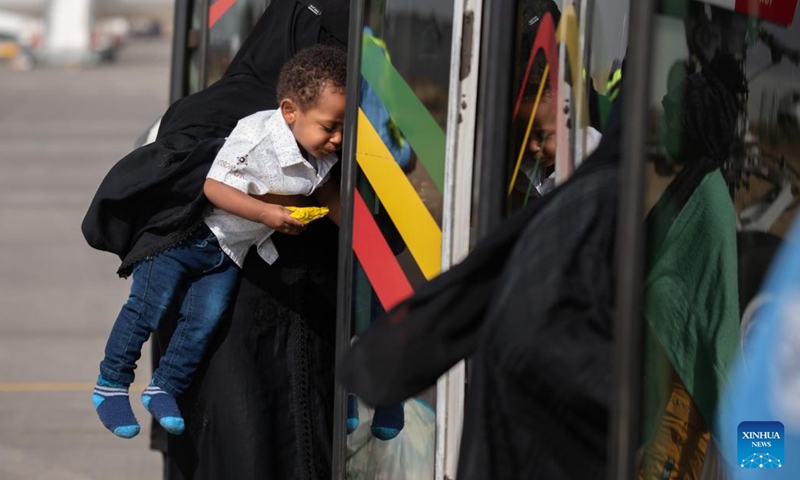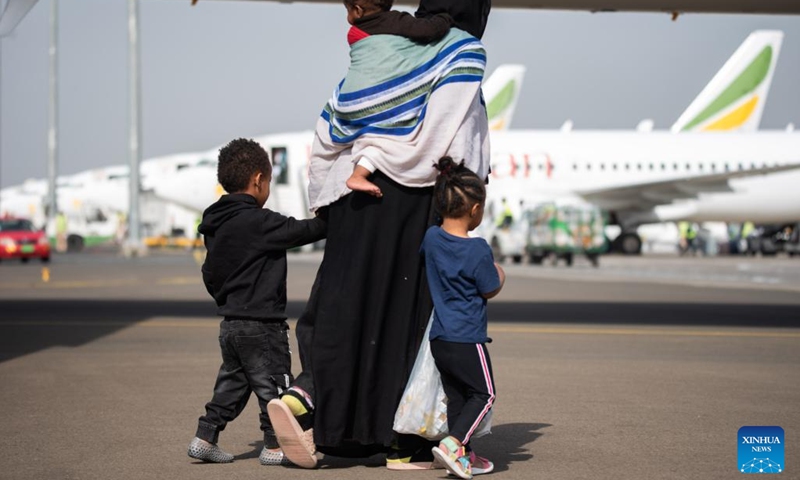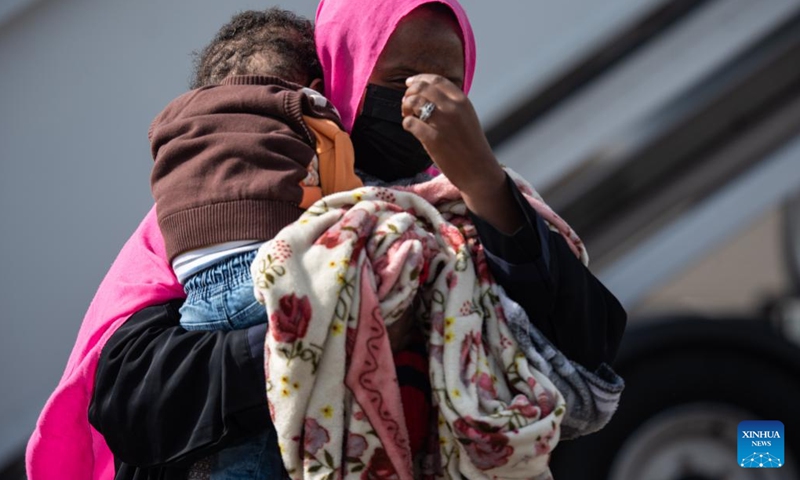
A woman and a child returning from Saudi Arabia get on a shuttle bus at Addis Ababa Bole International Airport in Addis Ababa, Ethiopia, on March 30, 2022. (Photo: Xinhua)

A woman and children returning from Saudi Arabia arrive at Addis Ababa Bole International Airport in Addis Ababa, Ethiopia, on March 30, 2022.(Photo: Xinhua)

An Ethiopian migrant returning from Saudi Arabia prays after arriving at Addis Ababa Bole International Airport in Addis Ababa, Ethiopia, on March 30, 2022.(Photo: Xinhua)

A woman and a child returning from Saudi Arabia arrive at Addis Ababa Bole International Airport in Addis Ababa, Ethiopia, on March 30, 2022.(Photo: Xinhua)
The government of Ethiopia on Wednesday repatriated 498 undocumented migrants from Saudi Arabia as part of its renewed operation to bring back citizens from the Gulf nation.
Dina Mufti, the spokesperson of the Ministry of Foreign Affairs of Ethiopia, said the Ethiopian government will step up the repatriation of Ethiopian nationals without documents from Saudi Arabia, highlighting that the repatriation is being carried out on a voluntary basis.
State Minister of Foreign Affairs of Ethiopia Birtukan Ayano told journalists during an event held at Addis Ababa Bole International Airport to welcome the latest batch of Ethiopian returnees that the Ethiopian government is set to repatriate all Ethiopian nationals stranded in Saudi Arabia involving up to three flights a day.
"We are planning to finalize the repatriation of Ethiopian nationals from Saudi Arabia within the coming 7-11 months. There are about 100,000 Ethiopian nationals in refugee (camps) and detention centers in (Saudi Arabia). Priority is given to women and children migrants," Ayano said.
Out of 498 total returnees, 157 of them are children while the rest are women, said Ayano who is also the chair of a committee in charge of overseeing the repatriation and rehabilitation of Ethiopian citizens from Saudi Arabia.
According to the state minister, the repatriation was kicked off after the Ethiopian delegation conferred with Saudi Arabian officials regarding the protection of the rights of Ethiopian citizens in Saudi Arabia and further facilitated the repatriation process.
Fetiya Usman, who is one of the returnees, told Xinhua about the appalling conditions in the detention center in Saudi Arabia, as she expressed happiness on returning back home safe.
"I stayed in the detention center for 14 months. We experienced appalling conditions there. Having passed all those challenges, we came home. Thanks to God," Tizita Derbie, another returnee, told Xinhua.
Ethiopian Minister of Women and Social Affairs Ergoge Tesfaye told Xinhua that the safe return of citizens from any corner of the world is the top priority of the government that pursues citizen-centered diplomacy. She said the returnees will be provided with all support from federal and regional governments as well as NGOs until they are well rehabilitated and integrated with their respective communities.
"During their stay in the transit centers, we have to avail the necessary food and non-food items. We need to work with partners like IOM, the whole sector has their own responsibilities and duties," Tesfaye added.
According to figures from the Ethiopian Ministry of Foreign Affairs, more than 750,000 Ethiopians are living in Saudi Arabia, out of whom 450,000 are residing in the Gulf nation without documents.
Estimates suggest that thousands of Ethiopians are trafficked to the Arabian Peninsula via Djibouti and Yemen every year, in hopes of finding jobs in Saudi Arabia.
Desperate Ethiopian migrants, who attempt to cross the dangerous Red Sea route via neighboring nation Djibouti, often endure deadly incidents along the Red Sea as well as imprisonment and killings in war-torn Yemen.
In recent months, Ethiopia has stepped up efforts to return home its citizens stranded in various foreign countries, mainly Saudi Arabia, as part of the government's newly unveiled "citizen-centered diplomacy."
The Ethiopian government is also working to dismantle sophisticated human trafficking networks, and create economic opportunities for nationals with low incomes.
